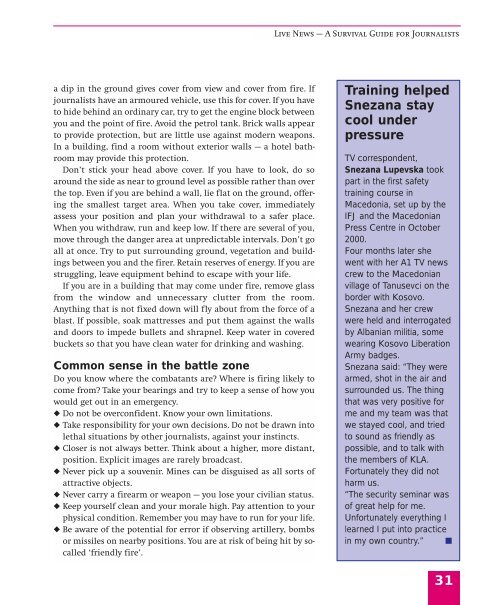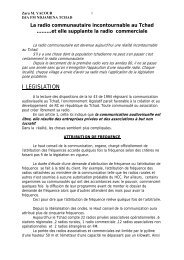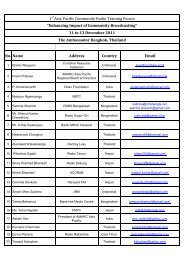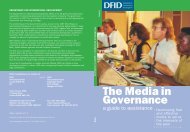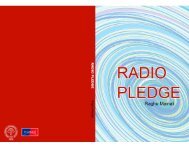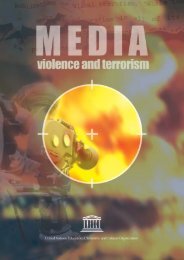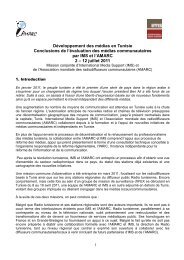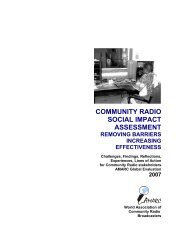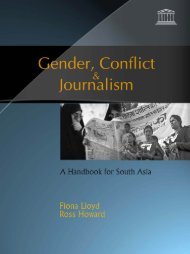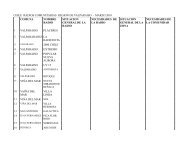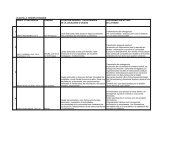Live News - A Survival Guide - International Federation of Journalists
Live News - A Survival Guide - International Federation of Journalists
Live News - A Survival Guide - International Federation of Journalists
- No tags were found...
You also want an ePaper? Increase the reach of your titles
YUMPU automatically turns print PDFs into web optimized ePapers that Google loves.
<strong>Live</strong> <strong>News</strong> — A <strong>Survival</strong> <strong>Guide</strong> for <strong>Journalists</strong>a dip in the ground gives cover from view and cover from fire. Ifjournalists have an armoured vehicle, use this for cover. If you haveto hide behind an ordinary car, try to get the engine block betweenyou and the point <strong>of</strong> fire. Avoid the petrol tank. Brick walls appearto provide protection, but are little use against modern weapons.In a building, find a room without exterior walls — a hotel bathroommay provide this protection.Don’t stick your head above cover. If you have to look, do soaround the side as near to ground level as possible rather than overthe top. Even if you are behind a wall, lie flat on the ground, <strong>of</strong>feringthe smallest target area. When you take cover, immediatelyassess your position and plan your withdrawal to a safer place.When you withdraw, run and keep low. If there are several <strong>of</strong> you,move through the danger area at unpredictable intervals. Don’t goall at once. Try to put surrounding ground, vegetation and buildingsbetween you and the firer. Retain reserves <strong>of</strong> energy. If you arestruggling, leave equipment behind to escape with your life.If you are in a building that may come under fire, remove glassfrom the window and unnecessary clutter from the room.Anything that is not fixed down will fly about from the force <strong>of</strong> ablast. If possible, soak mattresses and put them against the wallsand doors to impede bullets and shrapnel. Keep water in coveredbuckets so that you have clean water for drinking and washing.Common sense in the battle zoneDo you know where the combatants are? Where is firing likely tocome from? Take your bearings and try to keep a sense <strong>of</strong> how youwould get out in an emergency.◆ Do not be overconfident. Know your own limitations.◆ Take responsibility for your own decisions. Do not be drawn intolethal situations by other journalists, against your instincts.◆ Closer is not always better. Think about a higher, more distant,position. Explicit images are rarely broadcast.◆ Never pick up a souvenir. Mines can be disguised as all sorts <strong>of</strong>attractive objects.◆ Never carry a firearm or weapon — you lose your civilian status.◆ Keep yourself clean and your morale high. Pay attention to yourphysical condition. Remember you may have to run for your life.◆ Be aware <strong>of</strong> the potential for error if observing artillery, bombsor missiles on nearby positions. You are at risk <strong>of</strong> being hit by socalled‘friendly fire’.Training helpedSnezana staycool underpressureTV correspondent,Snezana Lupevska tookpart in the first safetytraining course inMacedonia, set up by theIFJ and the MacedonianPress Centre in October2000.Four months later shewent with her A1 TV newscrew to the Macedonianvillage <strong>of</strong> Tanusevci on theborder with Kosovo.Snezana and her crewwere held and interrogatedby Albanian militia, somewearing Kosovo LiberationArmy badges.Snezana said: “They werearmed, shot in the air andsurrounded us. The thingthat was very positive forme and my team was thatwe stayed cool, and triedto sound as friendly aspossible, and to talk withthe members <strong>of</strong> KLA.Fortunately they did notharm us.“The security seminar was<strong>of</strong> great help for me.Unfortunately everything Ilearned I put into practicein my own country.” ■31


